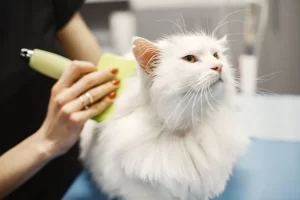Home remedies for UTI in dogs are a popular alternative to costly veterinary treatments, especially for pet owners who prefer a more natural approach to their dog’s health. UTI, or urinary tract infection, is a common condition that affects many dogs, causing pain, discomfort, and potential complications if left untreated. In this article, we dive into the causes and symptoms of UTI in dogs and presents a variety of effective home remedies to help alleviate the condition and promote healing in your furry friend. Whether you’re looking to complement your dog’s existing medication or want to try a more holistic approach, this article offers valuable insights and tips to help you manage your dog’s UTI with home remedies.
Table of Contents
ToggleHome remedies for UTI in dogs and puppies
It’s important to note that while some home remedies may provide relief from the symptoms of a UTI in dogs and puppies, it is important to consult with a veterinarian for proper diagnosis and treatment. Antibiotics are the most common treatment for UTIs in dogs and puppies and it should be prescribed by a veterinarian. However, there are some home remedies that can be used to provide relief and support the treatment of UTIs in dogs and puppies:
- Cranberry Juice: Cranberry juice is high in antioxidants and compounds that can help to prevent bacteria from adhering to the bladder and urinary tract. It is recommended to give the dog or puppy cranberry juice in small amounts, mixed with water.
- D-Mannose: D-Mannose is a natural sugar that can prevent bacteria from adhering to the bladder and urinary tract. It can be given to the dog or puppy in powder form, mixed with water or food.
- Probiotics: Probiotics can help to restore the balance of good bacteria in the urinary tract, which can help to prevent infections. It is recommended to give the dog or puppy probiotics in powder or capsule form, mixed with food.
- Vitamin C: Vitamin C is an antioxidant that can help to boost the immune system and prevent infections. It can be given to the dog or puppy in powder or tablet form, mixed with food.
- Apple Cider Vinegar: Apple Cider Vinegar can help to alkalize the urine, making it less hospitable for bacteria to thrive. It is recommended to give the dog or puppy apple cider vinegar in small amounts, mixed with water.
- Baking soda: Baking soda can help to neutralize the acidity of the urine and reduce the risk of bacterial infections. It is recommended to give the dog or puppy baking soda in small amounts, mixed with water.
- Herbs: Some herbs such as, goldenrod, uva ursi, and bearberry, have been traditionally used to support the urinary system. It is recommended to give the dog or puppy these herbs in infusion or tincture form, under veterinarian supervision.
- Water: Encouraging the dog or puppy to drink more water can help flush out bacteria and prevent infections.
- Limited access to food: Limiting the dog or puppy’s food intake can help reduce the amount of urine they produce, which can reduce the risk of infections.
- Limited access to sugar: Limiting the dog or puppy’s sugar intake can help reduce the number of bacteria in the urinary tract.
- Limited access to high-purine foods: Limiting the dog or puppy’s intake of high-purine foods can help reduce the risk of struvite crystal formation.
- Limited access to acidic foods: Limiting the dog or puppy’s intake of acidic foods can help reduce the acidity of the urine and decrease the risk of infections.
- Limited access to processed foods: Limiting the dog or puppy’s intake of processed foods can help reduce the number of chemicals and preservatives in the diet which can be harmful to the urinary tract.
- Regular grooming: Regular grooming can help keep the dog or puppy’s genital area clean and reduce the risk of bacterial infections.
- Regular veterinary check-ups: Regular veterinary check-ups can help to detect and prevent UTIs, as well as other health issues. It is also important to consult with a veterinarian if you suspect that your dog or puppy has a UTI.
What are UTIs in dogs and puppies?
A urinary tract infection or UTI is an infection that occurs in the urinary system of dogs and puppies. The urinary system includes the kidneys, bladder, ureters, and urethra. UTIs are caused by bacteria that enter the urinary tract and multiply, leading to inflammation and infection.
Dogs and puppies with UTIs may also experience other symptoms such as vomiting, diarrhea, loss of appetite, and lethargy.
UTIs are more common in female dogs and puppies, as their urethra is shorter and closer to the anus, making it easier for bacteria to enter the urinary tract. Certain breeds of dogs, such as miniature schnauzers and shih tzus, are also more prone to UTIs.
UTIs should be treated by a veterinarian as soon as possible, as they can lead to serious complications if left untreated. Treatment typically involves antibiotics to kill the bacteria and anti-inflammatory medication to reduce inflammation in the urinary tract. In some cases, a change in diet or an increase in water intake may also be recommended.
Most common symptoms of UTI in dogs and puppies?
The 10 most common symptoms of UTIs in dogs and puppies are:
- Frequent urination: Dogs and puppies with a UTI may need to urinate more often than normal, as the infection can cause inflammation and irritation in the urinary tract, leading to a constant feeling of needing to go.
- Pain or discomfort while urinating: Dogs and puppies with a UTI may show signs of pain or discomfort when urinating, such as whining, whimpering, or crying.
- Blood in the urine: UTIs can cause inflammation and irritation in the urinary tract, leading to the presence of blood in the urine.
- Increased thirst: Dogs and puppies with a UTI may drink more water than normal in an attempt to flush out the bacteria from the urinary tract.
- Urinating in inappropriate places: Dogs and puppies with a UTI may have difficulty holding their urine and may start urinating in places other than their designated potty area.
- Strong or foul-smelling urine: UTIs can cause changes in the appearance and smell of a dog’s urine, which may be stronger or more foul-smelling than normal.
- Vomiting: UTIs can cause nausea and vomiting, as the infection can spread to the kidneys and cause inflammation.
- Diarrhea: UTIs can cause diarrhea as the infection can spread from urinary tract to the gastrointestinal tract.
- Loss of appetite: Dogs and puppies with a UTI may lose their appetite due to the discomfort and pain caused by the infection.
- Lethargy: UTIs can cause fatigue and lack of energy as the infection can cause inflammation and affect the overall health of the dog.
It’s important to note that not all dogs will show the same symptoms, and some may not show any symptoms at all. It’s always best to consult with a veterinarian if you suspect that your dog or puppy has a UTI. Read more about our guide on how often should I take my dog to the vet?
What are the main causes of UTIs in dogs and puppies?
Here are the main causes of UTIs in dogs and puppies:
- Bacterial infection: UTIs are caused by bacteria that enter the urinary tract and multiply, leading to inflammation and infection. The most common types of bacteria that cause UTIs in dogs and puppies are Escherichia coli and Staphylococcus.
- Bladder stones: Bladder stones are small, hard mineral deposits that can form in the bladder, and can cause irritation and inflammation, leading to a UTI.
- Urinary tract obstruction: UTIs can occur when there is an obstruction in the urinary tract, such as a tumor, cyst, or blockage caused by a foreign object.
- Immune-mediated diseases: Some dogs and puppies may have an underlying immune-mediated disease that increases their risk of developing a UTI.
- Hormonal imbalances: Hormonal imbalances in dogs and puppies, such as diabetes or Cushing’s disease, can increase the risk of developing a UTI.
- Anatomical abnormalities: Some breeds of dogs are more prone to UTIs due to anatomical abnormalities, such as a narrow urethra or a short urinary tract.
- Stress: Stress can weaken the immune system, making a dog or puppy more susceptible to developing a UTI.
- Age: UTIs are more common in older dogs and puppies, as their immune system may not be as strong as younger dogs.
- Diet: A diet that is high in purines can increase the risk of developing a UTI.
- Lack of access to clean water: Dogs and puppies that do not have access to clean water may be more likely to develop a UTI.
- Lack of exercise: Dogs and puppies that do not get enough physical activity may be more prone to developing UTIs.
- Lack of hygiene: Dogs and puppies that are not kept clean, especially their genital areas, may be more likely to develop UTIs.
- Use of certain medications: Some medications, such as corticosteroids, can weaken the immune system and increase the risk of developing a UTI.
- Use of certain catheters: Using certain types of catheters or prolonged use of catheters may increase the risk of UTI.
- Genetics: Certain breeds of dogs are more prone to developing UTIs due to genetic predisposition.
It is important to note that not all UTIs are caused by the same factors, and it is best to consult with a veterinarian to determine the specific cause of a UTI in your dog or puppy.
how UTIs are diagnosed and medically treated in dogs and puppies?
Urinary Tract Infections (UTIs) in dogs and puppies require professional assessment and care from a veterinarian. The standard procedures for diagnosis and treatment are as follows:
- Physical Examination: A comprehensive physical examination of the canine, encompassing a meticulous assessment of the urinary tract and genital region, is conducted by the veterinarian.
- Urinalysis: A urine sample is collected and subjected to urinalysis, which involves a thorough examination to detect the presence of bacteria, blood, and abnormal cells, indicative of an infection.
- Urine Culture: To precisely identify the strain of bacteria responsible for the infection and determine the most effective antibiotic treatment, a urine culture is performed.
- Imaging: In specific cases, imaging techniques like X-rays, ultrasound, or CT scans may be employed to investigate any underlying conditions or irregularities within the urinary tract.
- Medication: Once the diagnosis of a UTI is established, the veterinarian prescribes antibiotics designed to eradicate the bacteria and alleviate inflammation. Completing the full antibiotic course, as directed by the veterinarian, is crucial to prevent the recurrence of infection.
- Dietary Recommendations: In certain instances, dietary modifications may be suggested to foster urinary tract health and reduce the likelihood of future UTIs.
- Follow-Up: To confirm the complete eradication of the infection and ensure that the dog or puppy is no longer contagious, follow-up urinalysis and urine culture tests are conducted.
It’s important to note that not all UTIs are the same, and the treatment will depend on the specific cause of the infection and the overall health of the dog or puppy. It is important to follow the veterinarian’s instructions and to bring the dog or puppy back for follow-up appointments as recommended by the veterinarian.
how to prevent UTIs in dogs and puppies
There are several steps that you can take to help prevent UTIs in dogs and puppies:
- Encourage drinking water: Make sure your dog or puppy has access to fresh, clean water at all times and encourage them to drink water throughout the day.
- Provide regular exercise: Regular physical activity can help to keep the urinary tract healthy and reduce the risk of UTIs.
- Keep the genital area clean: Regularly cleaning the genital area of your dog or puppy, especially females, can help to prevent bacteria from building up and causing an infection.
- Provide a healthy diet: A diet that is high in protein and low in purines can help to promote urinary tract health.
- Monitor your dog or puppy’s urinary habits: Be aware of any changes in your dog or puppy’s urinary habits, such as frequent urination, and consult with a veterinarian if you notice any changes.
- Maintain a healthy weight: Overweight dogs or puppies are more prone to UTIs, so it’s important to maintain a healthy weight for your dog or puppy.
- Avoid stress: Try to minimize stress in your dog or puppy’s life, as stress can weaken the immune system and increase the risk of UTIs.
- Avoid prolonged use of catheters: Prolonged use of catheters can increase the risk of UTIs, so it’s important to avoid prolonged use of catheters unless it’s necessary.
- Vaccinations: Keep your dog or puppy’s vaccinations up-to-date to help prevent infections from bacteria that could cause UTIs.
- Regular veterinary check-ups: Regular veterinary check-ups can help to detect and prevent UTIs, as well as other health issues.
It is important to note that not all UTIs can be prevented, but following these steps can help reduce the risk of UTIs in dogs and puppies.

UTI Risk Factors For Dogs and puppies
There are several risk factors that can increase a dog or puppy’s risk of developing a UTI:
- Female dogs and puppies: Female dogs and puppies are at a higher risk of developing UTIs due to their shorter urethra, which allows bacteria to enter the urinary tract more easily. For female dogs having UTIs, check out the most common remedies and treatments that you can try at home.
- Certain breeds: Some breeds of dogs, such as miniature schnauzers and shih tzus, are more prone to UTIs due to anatomical abnormalities such as a narrow urethra or short urinary tract.
- Age: UTIs are more common in older dogs and puppies as their immune system may not be as strong as younger dogs.
- Bladder stones: Dogs and puppies that have bladder stones are at a higher risk of developing UTIs. Avoid UTIs in dogs with kidney stones by keeping them healthy by following these home treatments and remedies.
- Urinary tract obstruction: Dogs and puppies that have an obstruction in the urinary tract, such as a tumor, cyst, or blockage caused by a foreign object, are at a higher risk of developing UTIs.
- Immune-mediated diseases: Dogs and puppies that have an underlying immune-mediated disease are at a higher risk of developing UTIs.
- Hormonal imbalances: Dogs and puppies with hormonal imbalances, such as diabetes or Cushing’s disease, are at a higher risk of developing UTIs.
- Stress: Dogs and puppies that are stressed are at a higher risk of developing UTIs.
- Diet: Dogs and puppies that are on a diet that is high in purines are at a higher risk of developing UTIs.
- Lack of access to clean water: Dogs and puppies that do not have access to clean water are at a higher risk of developing UTIs.
It is important to note that not all UTIs are caused by the same factors and not all dogs or puppies that have these risk factors will develop a UTI. It is important to consult with a veterinarian if you suspect that your dog or puppy has a UTI.
What breeds are more prone to getting UTI?
Certain breeds of dogs are more prone to developing UTIs due to their anatomy and genetics. These breeds include:
- Miniature schnauzers: Miniature schnauzers have a high incidence of developing UTIs due to their narrow urethra and predisposition to bladder stones.
- Shih Tzu: Shih Tzus have a high incidence of developing UTIs due to their short urinary tract and predisposition to bladder stones.
- Yorkshire terriers: Yorkshire terriers have a high incidence of developing UTIs due to their small size and short urinary tract.
- Cocker spaniels: Cocker spaniels are also prone to developing UTIs, especially in females, due to their short urethra.
- Bichon Frise: Bichon Frise are also prone to developing UTIs, especially in females, due to their short urethra.
- Lhasa Apso: Lhasa Apso are also prone to developing UTIs, especially in females, due to their short urethra.
- Maltese: Maltese are also prone to developing UTIs, especially in females, due to their short urethra.
- Pekingese: Pekingese are also prone to developing UTIs, especially in females, due to their short urethra.
It is important to note that not all dogs of these breeds will develop UTIs, and other breeds can also be at risk for developing UTIs as well. It is important to be aware of your dog’s urinary habits and to consult with a veterinarian if you suspect that your dog or puppy has a UTI.
what happens if UTI is left untreated in dogs or puppies?
If a UTI is left untreated in dogs or puppies, it can lead to serious complications. Some of the potential complications of an untreated UTI include:
- Kidney infection: UTIs can spread to the kidneys, leading to a kidney infection, which can cause serious damage to the kidneys and lead to kidney failure if left untreated.
- Bladder infection: UTIs can cause chronic bladder infections, which can lead to thickening of the bladder walls and difficulty urinating.
- Sepsis: UTIs can lead to sepsis, a serious condition that occurs when an infection spreads throughout the body and causes inflammation and organ damage.
- Urethral obstruction: UTIs can cause inflammation and swelling in the urethra, which can lead to a blockage and difficulty urinating.
- Struvite crystal formation: UTIs can cause formation of struvite crystals in the urinary tract which can lead to bladder stones or bladder infections.
- Recurrent UTIs: UTIs that are not treated properly can recur, leading to chronic infections and an increased risk of complications.
It’s important to note that not all untreated UTIs will lead to these complications, but it is important to consult with a veterinarian and follow the recommended treatment to avoid any potential complications.

How long does a bladder infection or UTI last in a dog or a puppy?
The length of time a UTI (bladder infection) lasts in a dog or puppy depends on several factors, including the severity of the infection, the type of bacteria causing the infection, and the effectiveness of the treatment.
A UTI caused by a common type of bacteria, such as Escherichia coli, can usually be treated with antibiotics within 5 to 7 days. However, in some cases, a UTI may take longer to resolve, and treatment may need to be extended for up to 14 days.
If the UTI is caused by a more resistant bacteria, treatment may take longer, and the dog or puppy may need to be on antibiotics for up to 4 weeks.
If the UTI is caused by struvite crystals, treatment may take longer and may include a special diet and antibiotics.
It’s important to note that treatment should only be discontinued when the veterinarian recommends it, even if the dog seems to be feeling better. Not completing the course of antibiotics as prescribed can lead to antibiotic resistance and recurring infections.
Regular follow-up urinalysis and urine culture will also be done to ensure that the infection has been completely cleared and that the dog or puppy is no longer contagious.
In addition, it’s important to keep in mind that preventing UTIs is the best way to avoid recurrent and prolonged treatment, by following the prevention steps mentioned earlier.
When should I take my dog or puppy to the vet for a UTI?
You should take your dog to the vet if you suspect that your dog has a UTI. Some of the signs that your dog may have a UTI include:
- Frequent urination
- Pain or discomfort while urinating
- Blood in the urine
- Increased thirst
- Urinating in inappropriate places
- Strong or foul-smelling urine
If your dog is showing any of these signs, it’s important to take them to the vet as soon as possible. UTIs can lead to serious complications if left untreated, and early treatment can help to prevent these complications.
In addition, if your dog is showing any other signs of illness, such as vomiting, diarrhea, loss of appetite, or lethargy, it’s important to take them to the vet to rule out any other health issues.
If your dog is a known UTI-prone breed or has a history of UTIs, it’s important to schedule regular veterinary check-ups to detect and prevent UTIs.
Even if you don’t see any signs, but you suspect your dog has a UTI, it’s still important to take them to the vet for an examination and urine analysis. Some dogs may not show any symptoms but still have an infection. It’s important to work closely with your veterinarian to determine the best course of treatment for your dog’s UTI and to prevent a recurrence.
Can UTIs be dangerous for dogs or puppies?
UTIs can be dangerous for dogs and puppies, especially if left untreated. UTIs can cause serious complications, such as:
- Kidney infection: UTIs can spread to the kidneys, leading to a kidney infection, which can cause serious damage to the kidneys and lead to kidney failure if left untreated.
- Bladder infection: UTIs can cause chronic bladder infections, which can lead to thickening of the bladder walls and difficulty urinating.
- Sepsis: UTIs can lead to sepsis, a serious condition that occurs when an infection spreads throughout the body and causes inflammation and organ damage.
- Urethral obstruction: UTIs can cause inflammation and swelling in the urethra, which can lead to a blockage and difficulty urinating.
- Struvite crystal formation: UTIs can cause formation of struvite crystals in the urinary tract which can lead to bladder stones or bladder infections.
- Recurrent UTIs: UTIs that are not treated properly can recur, leading to chronic infections and an increased risk of complications.
It’s important to note that not all untreated UTIs will lead to these complications, but it is important to consult with a veterinarian and follow the recommended treatment to avoid any potential complications. Also, it’s important to keep in mind that preventing UTIs is the best way to avoid recurrent and prolonged treatment, by following the prevention steps mentioned earlier.
References:
- Shin CN. The effects of cranberries on preventing urinary tract infections. Clin Nurs Res. 2014 Feb;23(1):54-79.
- Saeed, S. Herbal remedies for urinary tract infection. International Journal of Biology and Biotechnology (Pakistan). ISSN : 1810-2719
- Urinary Tract Infections (UTIs) in Dogs
- Does Your Dog Have UTI Symptoms or Something Worse?
- Signs of Bladder Infection in Dogs














